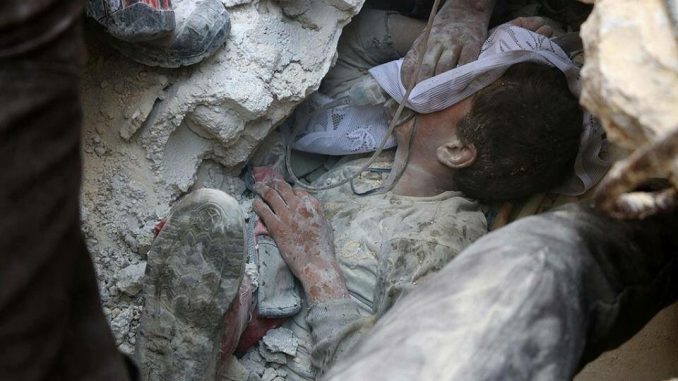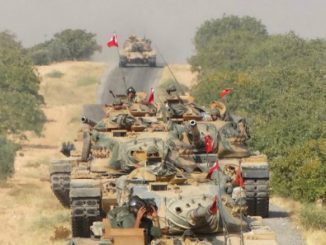
Tens of thousands of civilians have fled death, bombing and ongoing military operation in rebel-held areas of Aleppo to save their lives, only to find death and forced abduction waiting for them as they left.
The Assad regime forces, backed by Russian air power, Iranian ground forces and Shi’ite militia fighters from Iran, Iraq, and Lebanon, has been tightening its grip on rebel-held districts of Aleppo since the start of this year.
They have gradually closed in on eastern Aleppo this year, first cutting the most direct lifeline to Turkey before fully encircling the east, and launching a major assault in September that killed hundreds of civilians but was blocked by the rebels.
The offensive was followed by a ceasefire for a week and threats for the rebels to withdraw, which were ignored.
Assad regime forces started a major offensive to push opposition fighters out of the besieged eastern half of the city on 15 November.
Helicopters continue extensively dropping barrel bombs in conjunction with airstrikes by warplanes on areas in the eastern neighborhoods of the city, accompanied by artillery shelling by the regime forces in the same places.
Civilians were also suffering through daily bombing, including by bunker-buster and incendiary weapons, and through starvation, as limited supplies run out and aid convoys are blocked from the city.
The regime’s forces’ persistent and the intensive airstrikes forced the rebels to leave the areas they hold.
In a blistering, three-week offensive, Assad regime forces have seized about 80 percent of east Aleppo, a stronghold for rebel groups since 2012, and became close to winning the battle there.
The Syrian Civil Defence, a first responder group also known as the White Helmets, said air strikes and shelling on Wednesday killed 61 people in what’s left of the rebel-held east of the city.
This big number of deaths isn’t new, as Assad regime offensives since September have left more than 1500 civilians killed, according to a war monitor and civil defense teams.
Assad regime bombardment targeted the vital point in Aleppo, the hospitals, and civil defense centers. After heavy bombardment no hospitals were left in eastern Aleppo, adding a new suffer and making the victims’ numbers increase.
“Intensified ground fighting and indiscriminate aerial bombardment over the past few days in eastern Aleppo city has reportedly killed and injured scores of civilians,” said UN humanitarian chief, Stephen O’Brien. “There are no functioning hospitals left, and official food stocks are practically finished.”
“For the sake of humanity, we call on, we plead, with the parties, and those with influence, to do everything in their power to protect civilians and enable access to the besieged part of eastern Aleppo before it becomes one giant graveyard,” O’Brien said.
A mother with her child and a whole family were killed by Assad and Russian warplanes in my district#StandWithAleppo#Aleppo #Syria pic.twitter.com/9EoNp1u6ox
— Lina shamy (@Linashamy) December 8, 2016
38 civilians were killed & 200+ injured in besieged #Aleppo city yesterday.https://t.co/xH4lZHpHBr#StandWithAleppo pic.twitter.com/5YwwKICjzP
— The White Helmets (@SyriaCivilDef) December 7, 2016
The UN haven’t been able to stop the Assad-Russian offensive since its very beginning, and will not be able to convince them to stop it as their victory became close.
The only way the UN can save its face and claim that it is worried about Aleppo is by calling for “safe evacuation for civilians.”
With hospitals, clinics, water and food cut off, UN chief Ban Ki-moon called the situation was “heartbreaking”.
U.N. Syria humanitarian adviser Jan Egeland said on Thursday that the United States and Russia must broker an evacuation from east Aleppo.
“Russia said they will definitely be discussing with us how to organize the evacuations, but they are not any more promising any pause (in fighting),” Egeland said.
“Today 150,000 people are threatened with extermination,” he said.
Entering the Old City of #Aleppo yesterday to evacuate people. Ruins lined the narrow streets, making it nearly impossible to get through. pic.twitter.com/UEH2hJkrey
— ICRC Syria (@ICRC_sy) December 8, 2016
Hunted by death and abduction inside and out
Tens of thousands of civilians have fled the killing in east Aleppo in recent weeks, while some 150,000 civilians are believed to remain in the “ever-shrinking” opposition-held districts of the city.
Reports that extremists had prevented some civilians from fleeing, according to UN human rights spokesman Rupert Colville
“Some of the civilians who are attempting to flee are reportedly being blocked by armed opposition groups,” Colville told reporters in Geneva.
“During the last two weeks, Fateh al-Sham Front [formerly al-Nusra Front] and the Abu Amara Battalion are alleged to have abducted and killed an unknown number of civilians who requested the armed groups to leave their neighborhoods, to spare the lives of civilians.”
In addition, the groups had reportedly “demanded that activists inform them of civilians attempting to leave, along with the names of those who participated in protests against the presence of the Jabhat Fateh al-Sham group and other groups affiliated with them” in several neighborhoods a few weeks ago, Colville said.
Some say that Fateh al-Sham Front is the direct reason for the fall of Aleppo, as they refused to leave when UN asked them too, and attacked rebel groups who supported this request.
Disabled #Syrian woman #SabahMohammed died on wheelchair as her husband waits for help after #Assad regime's bombardment #Aleppo #Syria #AA pic.twitter.com/t7gggV84SG
— Anadolu Images (@anadoluimages) December 8, 2016
But even after their escape, the civilian were not safe.
An AFP news agency correspondent in east Aleppo said it had become increasingly difficult to find food because shopkeepers were too afraid to open and sell their meager wares under the heavy government fire.
He said fleeing civilians had seen bodies lying uncollected in the streets of one neighborhood because the intensity of the bombardment made it too dangerous to retrieve the dead.
Those bodies and many others belong to civilians who were targeted as they were trying to flee the intensive bombardment.
One of the first incidents happened on December 1, as the civil defense sources told.
“Today there was another massacre, I witnessed it. The displaced people were coming at 6:30 am. There was artillery shelling while they were walking in the streets. Really, it was so, so horrible,” said Aref al-Aref, a nurse, and photographer in a rebel-held part of the city.
Footage sent by the Civil Defense rescue operation, purportedly of the aftermath, showed people lying in the street in pools of blood, including a woman dressed in black who had been carrying a large backpack.
45 Civilians killed early this morning by #Assad shells while they're trying to flee from East to West besiege #Aleppo @SyriaCivilDef pic.twitter.com/DcSSFUAES5
— Ahmad Alkhatib (@AhmadAlkhtiib) November 30, 2016
Last call for passengers to #Paradise, Free entering, No #Visa, No #passport
No need your bags, Just Leave this ugly @Earth #Aleppo Today pic.twitter.com/B16V4FaGYh— Ahmad Alkhatib (@AhmadAlkhtiib) November 30, 2016
Even after they fled safely, the end wasn’t happy for many civilians.
Hundreds of men from eastern Aleppo have gone missing after leaving rebel-held areas, the United Nations’ human rights office said on Friday, voicing deep concern over their fate at the hands of government forces.
UN human rights spokesman Rupert Colville told a news briefing the office had heard “worrying allegations that hundreds of men have gone missing after crossing into government-controlled areas” of Aleppo.
“Given the terrible record of arbitrary detention, torture and disappearances, we are of course deeply concerned,” he said.
Colville said family members had reported losing contact with the men, who are between the ages of 30 and 50 after they fled opposition-held areas of Aleppo about a week ago.
“As we have seen before, across Syria and throughout the conflict, men, women and children, have been routinely arrested at government-controlled checkpoints, before being transferred to one of dozens of official or secret government-run detention facilities,” Stephen O’Brien said.
“They are often held incommunicado and indefinitely, facing the risk of being subjected to torture and ill-treatment, extrajudicial killings or being disappeared.”
A woman was carrying her only child and crying. “They took my husband after we arrived here, I don’t have anyone else in this life but him. All my family and his family are dead, we have only one another and now they took him from me,” she said.
مباشر على #Periscope #StandwithAleppo #Aleppo #Syria Why can't we go to regime areas https://t.co/0kEAQ8j90d
— @Mr.Alhamdo (@Mr_Alhamdo) December 9, 2016
Capturing eastern Aleppo would be the biggest victory for Assad regime since the start of the revolution against him in 2011, restoring his control over the whole city apart from a Kurdish-held area that has not fought against him.
It would also be seen as a victory for his allies, Russia and Iran, which have outmaneuvered the West and Assad’s regional enemies through direct military intervention.
For Assad regime, taking back Aleppo would make its forces focus on ending the remaining rebels-held areas. These areas include the rebels’ stronghold in Idlib in addition to isolated areas in rural Damascus, Homs, and Hama.
These areas have been under daily bombardment and crippling siege for years. The Old city of Homs and parts of rural Damascus has already been lost to Assad regime, and the remaining areas are expected to follow.
As a conclusion, defeating the rebels and retrieving Aleppo means destroying the last major resistance stronghold of the Syrian rebels and will lead eventually to the victory of Assad regime and ending the Syrian revolution.
The fate of rebel-held Aleppo spells the abject failure of the west’s contradictory and piecemeal policies. It is a humiliation for the UN. Its fall will be an unequivocal victory for Russian strategy. Aleppo will join an infamous list of cities whose names are synonymous with mass crimes committed while the world looked impotently on: Srebrenica, Grozny, even Guernica.



